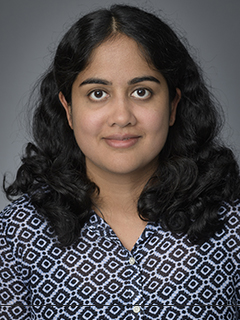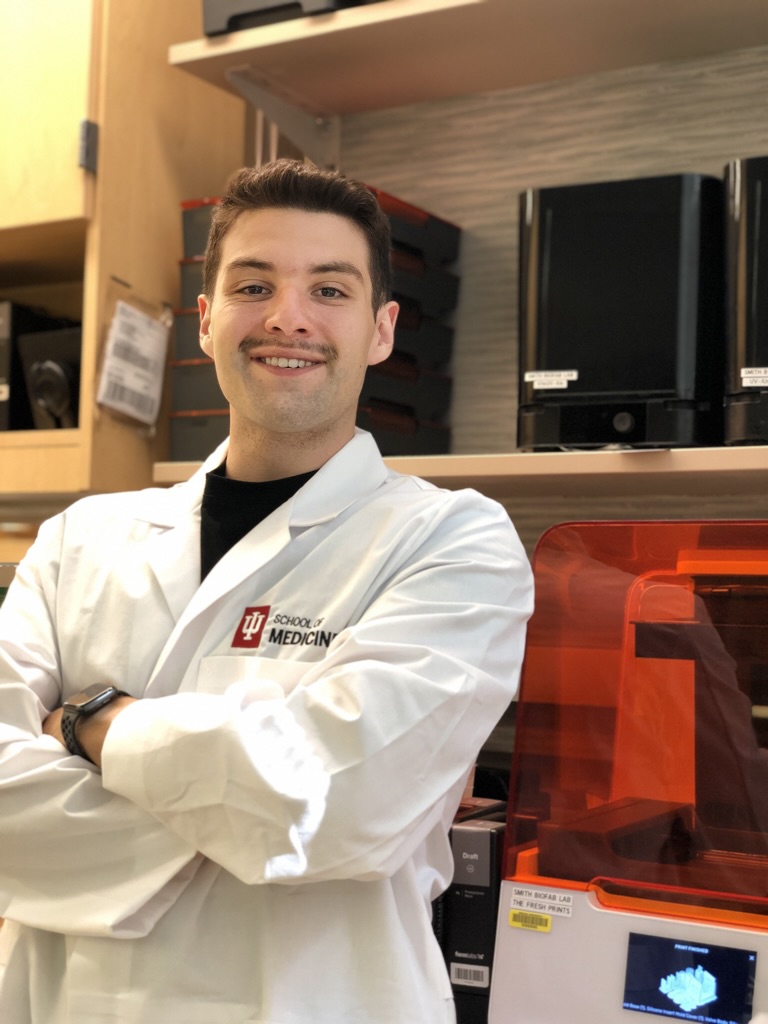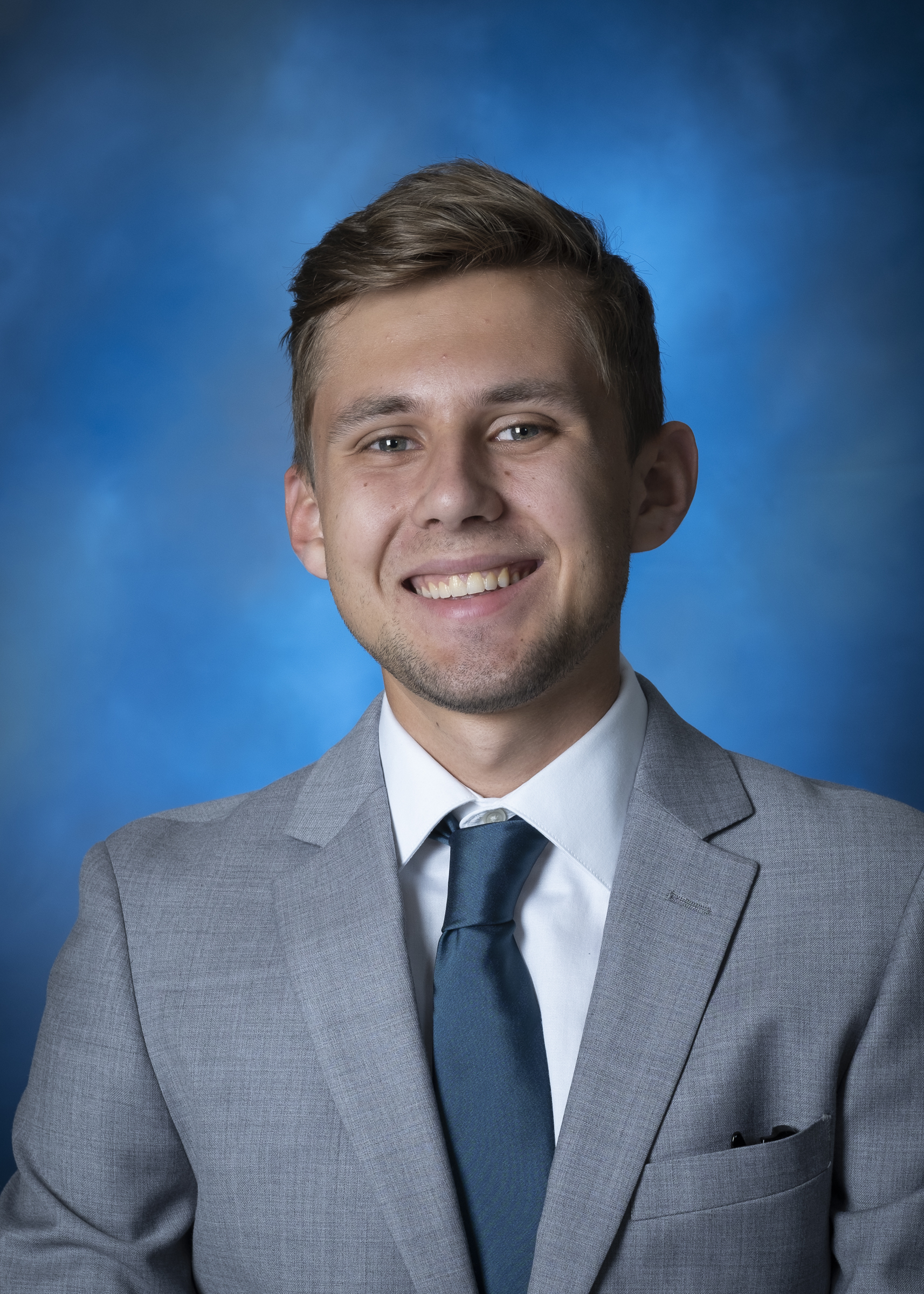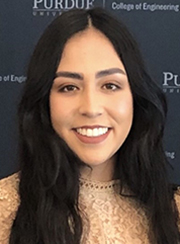TPAN Fellow Spotlights
Current T32 Fellows
Abbie Mollison
Short Bio:
Abbie received her BS in Neuroscience and French/Francophone studies from Creighton University in 2022. Her previous research includes pharmaceutical research in animal models, tracking language accuracy in French and Spanish second language learners, and conducting fNIRS research with cochlear implant (CI) CI users in virtual auditory environments. She joined the Brain Research in Auditory Neuroscience (BRAiN) Lab in July 2024 under the mentorship of Dr. Maureen Shader. Her research focuses on improving fNIRS testing and data processing methods for increased reliability and the effects of auditory signal masking on speech perception in CI users. When not in the lab, Abbie likes to lift at the gym, paint, play video games, and play with her cats.
Quote:
"Something I love about the auditory neuroscience group at Purdue is the broad range of research being conducted. I feel that I've become a much better student and researcher through the mentorship I have received. The students and faculty in TPAN have fostered a collaborative environment that I am so grateful to be a part of. I'm looking forward to continuing my research and contributing to the field of auditory neuroscience."
Damen Wilson
Short Bio:
Damen received a BS degree in Biomedical Engineering at Purdue University in 2022. His previous research focused on signal processing of human surface cardiac and gastric electrical signals. He is currently in the graduate phase of the joint Medical Scientist Training Program (MSTP) between Indiana University School of Medicine and the Weldon School of Biomedical Engineering. His current research, with Dr. Ward’s BioCom Lab, aims to utilize transcutaneous auricular vagus nerve stimulation in various conditions, such as Ehlers Danlos Syndrome and tinnitus. When not researching, Damen likes to work on home renovation projects, play video games, or go for a run.
Quote:
"So far, my experience with the auditory neuroscience group at Purdue has been an awesome initiation for me to explore the field. Everyone is very passionate about their work and eager to share it with you. Coming from a nonauditory background, I can say that everyone has been welcoming and eager to help. I am super excited to be a part of TPAN and all that it offers."
Meredith Ziliak
Short Bio:
Meredith is a PhD candidate in Purdue University's PULSe Interdisciplinary Life Sciences program. She earned her BS in Neuroscience from IUPUI where she conducted research on mental imagery and robotic surgical skill acquisition in the IU School of Medicine's Department of Surgery. This early experience solidified her desire for a research-focused career. Once at Purdue, Meredith joined Dr. Edward Bartlett's Central Auditory Processing Lab in 2022. Her research now focuses on understanding how different auditory stressors (e.g. aging, noise, metabolic disorders) impact the brain's ability to encode and process sound. Outside the lab, Meredith enjoys experimenting with recipes and travelling to new places.
Quote:
"Sensory systems shape the way we perceive our world; I think that's fascinating. It's important to understand what happens when our systems are damaged, and how that influences our interactions with our environment. Becoming a TPAN fellow opened opportunities for me to explore research addressing these issues by joining a collaborative support system focused on achieving similar goals. I'm excited to be a part of the auditory research community and contribute to the development of diagnostic and therapeutic patient care."
NIH National Research Service Award (NRSA) Recipients
Our TPAN-affiliated trainees are encouraged to apply for highly-competitive NIH and NSF fellowships during their tenure. Our NRSA recipients are listed below.
Samantha Hauser, AuD | F32 pre-doc Recipient
Short Bio:
Sam received her BA in biology from the University of Chicago and went on to complete her Doctorate in Audiology (AuD) at Vanderbilt University. After a few years working as a clinical audiologist, Sam joined the Speech, Language, and Hearing Science PhD program at Purdue in the fall of 2021. Her interests in cross-species and translational hearing science brought her to the labs of Dr. Michael Heinz and Dr. Hari Bharadwaj where she aims to improve diagnostic measures of sensorineural hearing loss and understand the perceptual effects of cochlear pathologies. When not in the lab, Sam enjoys hanging out with her dogs, doing crosswords, and listening to music.
Grant Title: Individualized Profiles of Sensorineural Hearing Loss from Non-Invasive Biomarkers of Peripheral Pathology
Quote:
"I was a little worried about going back to research after three years in the audiology clinic, but I feel so at home within the hearing science community at Purdue. The faculty includes experts in every aspect of hearing from the cochlea to clinical practice, and each student has a unique background and perspective. This diversity of expertise is integral to the training program, but the feeling of camaraderie is what sets Purdue apart. Everyone is passionately curious, excited about research, and committed to the success of each other’s work and growth. I am fortunate to be a part of TPAN, learning from the current and future leaders of auditory neuroscience."
Andrew Sivaprakasam | F30 Recipient

Short Bio:
Andrew is currently in the graduate phase of the joint Medical Scientist Training Program (MSTP) between Indiana University School of Medicine and the Weldon School of Biomedical Engineering. He received his B.S. in Bioengineering from the University of Pittsburgh, where he completed work in the Orthopaedic Biodynamics Laboratory and Human Engineering Research Laboratories. While on his interview at Purdue, he found that work happening at SLHS was fascinating and combined his research interests with his passion for sound and music. This led to a collaborative mentorship between Dr. Mike Heinz (Auditory Neurophysiology and Modeling Lab) and Dr. Hari Bharadwaj (SNAPLab). His current project utilizes a cross-species framework to investigate the consequences of hearing loss which lead to impaired processing of pitch. When not in the lab or jamming out on the violin, Andrew enjoys photography and running.
Grant Title: Place and Time Processing of Pitch in the Context of Cochlear Dysfunction
Quote:
"When I first toured Lyles-Porter Hall, I felt like a kid in a candy store. Here was a place that had everything needed to look at the same clinical issue from a variety of perspectives, get a good idea of the underlying electrophysiology, and begin working on solutions. Additionally, the students and faculty here were among the most encouraging that I have ever met-- always willing to teach, if you are willing to learn. The TPAN will help me accomplish my goals, and will provide resources that will enable me to seek out opportunities and further mentorship and guidance that will help me succeed as a physician-engineer."
Vibha Viswanathan, PhD | F31 Recipient
Short Bio:
Vibha received a B.E. degree in Electronics and Communication Engineering from Anna University, India in 2006. She then completed a Master's degree in Electrical Engineering at the University of Michigan, Ann Arbor in 2007, specializing in Signal Processing and Statistics. Following this, she worked at The MathWorks for seven years, where she developed, tested, and provided application support for core MATLAB mathematical algorithms, and MATLAB tools for Signal and Image Processing. In 2015, she joined Boston University as a Research Fellow, where she was introduced to Auditory Neuroscience and studied the neural mechanisms of auditory selective attention. In 2020, she graduated from Purdue University with a Ph.D. in Biomedical Engineering, where she investigated neural coding of speech in noise and speech intelligibility modeling, using a combination of computational modeling, electroencephalography, and behavioral experiments. She is now Special Faculty in the Neuroscience Institute at Carnegie Mellon University.
Grant Title: Neurophysiological Mechanisms of Speech Intelligibility in Noise - A Quantitative Framework
Quote:
"TPAN and the Auditory Neuroscience community at Purdue have exposed me to the wide range of approaches used in neuroscience research, and the different scales at which the auditory system can be studied. By supplementing my engineering background with this training, I wish to pursue a research career that integratively studies the neuroscience of human audition along with applications to the clinic and audio signal processing inspired by the brain."
NSF Graduate Research Fellowship Program (GRFP) Recipients
Hammad Khan

Short Bio:
Hammad received a BS degree in electrical and computer engineering at Montana State University in 2020. His previous research focused on fabricating devices to biomechanically modulate calcium and mitochondrial dynamics in neurons. He joined Krishna Jayant’s Nano Neurotechnology Lab in the Fall of 2020 where he aims to unravel the role of auditory feature binding in the hippocampus during environmental navigation using a combination of electrophysiology, imaging, and computation. When not in lab, he likes to dive into a good book or two and enjoys hiking.
Quote:
"The auditory community at Purdue is a hub for exciting research and amazing mentors and has helped me springboard into the field of auditory research and neuroscience. The mentors I have interacted with have endowed me with the knowledge and confidence to independently pursue my ideas. I am confident that TPAN will support my endeavors in pursuing new and exciting questions where I aim to bring my engineering background to pursue clinically relevant auditory issues."
Previous T32 Fellows
Cole Trent
Short Bio:
Cole received his BS in Speech, Language, and Hearing Sciences from Purdue University in May of 2023. He applied to the Auditory Neuroscience Ph.D. program at Purdue, was accepted, and started his graduate schooling in August of 2023. Cole Joined the Brain Research in Auditory Neuroscience (BRAiN) Lab in January, 2022 with Dr. Maureen Shader. He now studies under her mentorship, along with his co-mentor, Dr. Yunjie Tong, an associate professor in the Weldon School of Biomedical Engineering. Cole’s research interests are in individual listening and decoding strategies, particularly in cochlear implant users. In his free time, Cole enjoys to spend it outside hiking, golfing, fishing, and snowboarding. He also loves to listen to and play music which is part of his inspiration for his studies.
Quote:
"My passions lie at the intersection of neuroscience and technology. I am particularly interested in the cochlear implant (CI) population. Being accepted into the Interdisciplinary Training Program in Auditory Neuroscience (TPAN) program at Purdue will allow me to further branch out into the fields of both auditory neuroscience and biomedical engineering,. Thanks to this program, I will be able to conduct research in multiple labs across multiple disciplines during my graduate school career."
Fernando Aguilera de Alba
Short Bio:
Fernando completed his bachelor’s degree in Biomedical Engineering at Arizona State University. In the Summer of 2020, he joined the Heinz Lab as an undergraduate researcher under the Summer Undergraduate Research Fellowship (SURF), through the Pathways Scholars Program. The following year, Fernando enrolled at Purdue University as a Ph.D. student in the Weldon School of Biomedical Engineering under the advisory mentorship of his undergraduate research mentor, Dr. Michael Heinz (with Ed Bartlett and Hari Bharadwaj as thesis-committee members). Currently, Fernando aims to study the physiological and anatomical effects of blast injury on the peripheral and early sub-cortical stages of the auditory system. In his free time, Fernando loves travel, soccer, Brazilian jiu-jitsu, and learning languages.
Quote:
"Coming to Purdue became a dream after completing my undergraduate research experience prior to graduation because of the people. The auditory neuroscience community at Purdue has always been extremely friendly, genuine, and encouraging. The faculty and student mentorship were key to ensure I had the required knowledge and skills to become successful in the future given my limited auditory background. Being part of TPAN has allowed me to pursue my personal research interests by providing the tools and connections to become a well-rounded researcher."
Samuel Senneka
Short Bio:
Samuel received his B.S. in Biomedical Engineering in the spring of 2022 at Purdue University. He started research in Dr. Maria Dadarlat’s lab in the spring of 2021 working on developing a cage for autonomous electrophysiology experiments with mice. He started his PhD in the fall of 2022 continuing his work with Dr. Dadarlat where he aims to discover the effects of multisensory integration on learning artificial electrical stimulation to perform behavioral tasks. In the future he wants to work towards developing sensory prosthetics that send information that can be processed by the brain similar to innate senses. In his free time, he enjoys longboarding, water sports, and disc golfing with his friends.
Quote:
"So far everyone I have met within the auditory neuroscience field at Purdue have been amazing. All the research I have seen is cutting edge and I can't wait to delve further into the world of auditory neuroscience."
Laura Roa
Short Bio:
Laura received her B.S.E in biomedical engineering from Arizona State University and is now a second year PhD student in the Weldon School of Biomedical Engineering. Laura works in the Nano Neurotech Lab headed by Dr. Krishna Jayant and is studying how complex spectrotemporal features are encoded at the individual and clustered spine level in the primary auditory cortex. Outside of research, Laura is the president of the BME graduate student association and enjoys distance running, gardening, and reading.
Quote:
"I am grateful to the TPAN for giving me the opportunity to both develop my interdisciplinary project and work outside of my department in a highly diverse group of researchers and collaborators. Being a part of the multi-faceted auditory neuroscience community at Purdue will not only lend me the broader understanding I need to enrich my work in the primary auditory cortex, but also the mentorship and tools I need to succeed as a graduate student researcher. I am excited and proud to belong to such a distinguished group of hearing science faculty and researchers."
Morgan Chaney
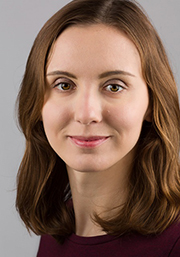
Short Bio:
Morgan received her B.S. and M.S. in Biology from Indiana State University. She started her Ph.D. with Purdue University’s Biological Sciences department in Fall 2019. Within the department she works with the Ecology and Evolutionary Biology research group, specializing in sensory ecology. She is co-advised by Jeffrey Lucas and Esteban Fernandez-Juricic, studying the auditory and visual systems of birds. Her current project is using the polymorphic white-throated sparrow (Zonotrichia albicollis) to examine the physiological response to morph-specific acoustic and visual stimuli. Morgan spends her free time catching up on the latest video games, bird watching, and pampering her two (very fluffy) cats.
Quote:
"My research interests have gone through some rather drastic changes since I started college, but I don’t think I could have ever anticipated that I would be in this position today. I’ve only been here for a year and I have already been taken aback by the outstanding faculty and research that is associated with Purdue’s auditory neuroscience group. I’m tremendously proud and grateful that I get to participate in the TPAN. Intertwining ecology with auditory neuroscience opens so many doors for potential research and I’m excited to learn the skills needed to tackle them."
Joseph Fernandez
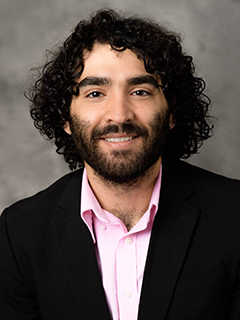
Short Bio:
Joseph is a third year student in the Interdisciplinary Biomedical Sciences Program (IBSc), a joint program through the Weldon School of Biomedical Engineering and the Basic Medical Sciences Department. He received his B.S. in Psychology (Neuroscience) from Yale University. His research examines the effects of mild blast induced traumatic brain injury (mbTBI) on the central auditory pathway. Many patients with mbTBI suffer from a variety of chronic auditory and behavioral deficits, however, the mechanisms underlying these impairments are poorly understood. As such, Joseph is interested in understanding the mechanisms of secondary oxidative and inflammatory damage following mbTBI, and how these correlate with functional deficits in auditory processing, creating a spatio-temporal road map of the post injury brain. When not researching, Joseph loves to travel, is an avid gardener, and can often be found whipping up a new creation in the kitchen.
Quote:
"Both my program and my project are inherently interdisciplinary in nature, and I knew the TPAN was exactly the type of program that fits within my personal view of research. Namely, the most impactful results are achieved through interdisciplinary training and research. As such, I am constantly striving to improve my research techniques by learning from a diverse group of researchers, and the TPAN provides me with an excellent opportunity to do this. With the TPAN I am certain I will hone my understanding of my research both in terms of auditory processing and CNS injury mechanisms, through the help of a varied and excellent community of hearing science researchers."
William Salloom (current F32 fellow, at USC)
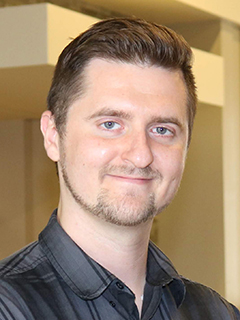
Short Bio:
Will is an integrative neuroscience PhD candidate in the Purdue University Life Sciences program (PULSe). Will earned a BA in psychology, emphasizing behavioral neuroscience and biology, at California State University Northridge. He currently works in Beth Strickland’s (PI - SLHS) Psychoacoustics Lab, where he studies the behavioral effects of two auditory efferent systems that can adjust the dynamic range of the peripheral auditory system in response to sound. These systems are the medial olivocochlear reflex (MOCR) and the middle-ear muscle reflex (MEMR). More recently, Will has begun to collaborate with Hari Bharadwaj (SLHS/BME – SNAP Lab) to combine physiological measurements of these systems, and compare them to the behavioral data. Will is also a Los Angeles Lakers fan, enjoys animal documentaries, and loves BBQ.
Quote:
"I am proud to be part of TPAN and the growing auditory neuroscience community at Purdue. The TPAN program provides fundamental training and coursework for an increasingly diverse field. I feel that this strategy is strong, as auditory neuroscience graduate students come from a range of different disciplines and backgrounds, yet there are underlying principles in the field. Furthermore, the auditory neuroscience faculty here at Purdue are incredibly supportive of the growth and success of their students."
Matthew Thompson

Short Bio:
Matt received his B.S. in mechanical engineering from Indiana University-Purdue University, Fort Wayne and his M.S. in biomedical engineering from Purdue. He is now a Ph.D. student studying early signals guiding cochlear development from a systems biology approach using quantitative fluorescent imaging data to inform, validate, and characterize dynamical models of biochemical networks. Outside time spent on research, he enjoys life with his wife, two-year-old daughter, and friends.
Quote:
"Hearing science is not where I imagined ending up as an undergraduate, but the indirect path I took to developing an interest in quantitative biology research has introduced me to a fascinating and highly complex system that’s the subject of a diverse range of research at Purdue. The hearing science community is spectacular, and faculty demonstrate genuine interest in students’ success. This is made clear through their talented teaching, involved mentorship, and approachable demeanor. Acceptance into the TPAN has helped me to gain a much broader and more complete understanding of the context in which the subject of my project sits that I would not have benefited from outside the program."
Ravinderjit Singh [founding President of student group Auditory Neuroscience at Purdue (ANAP)]

Short Bio:
Ravinderjit is a fourth year student in the medical scientist training program (MSTP), a dual degree program (MD & PhD) between IU and Purdue. He received his B.S. in Electrical Engineering at Georgia Tech in Atlanta, Georgia. Ravinderjit works in the SNAP Lab to combine behavioral and physiological data to better understand the mechanisms of auditory source separation and binaural hearing. In his spare time, Ravinderjit enjoys playing basketball and watching college and professional sports.
Quote:
"One aspect of the TPAN that I have very much enjoyed is how it helped immerse me into the hearing community at Purdue. I am personally interested in the sensory encoding of hearing in the nervous system, but at Purdue, hearing is studied in many other ways than just that. The exposure to the diverse types of hearing research going on at Purdue has helped me better understand my own work as well as inform new ideas and projects I can pursue."




